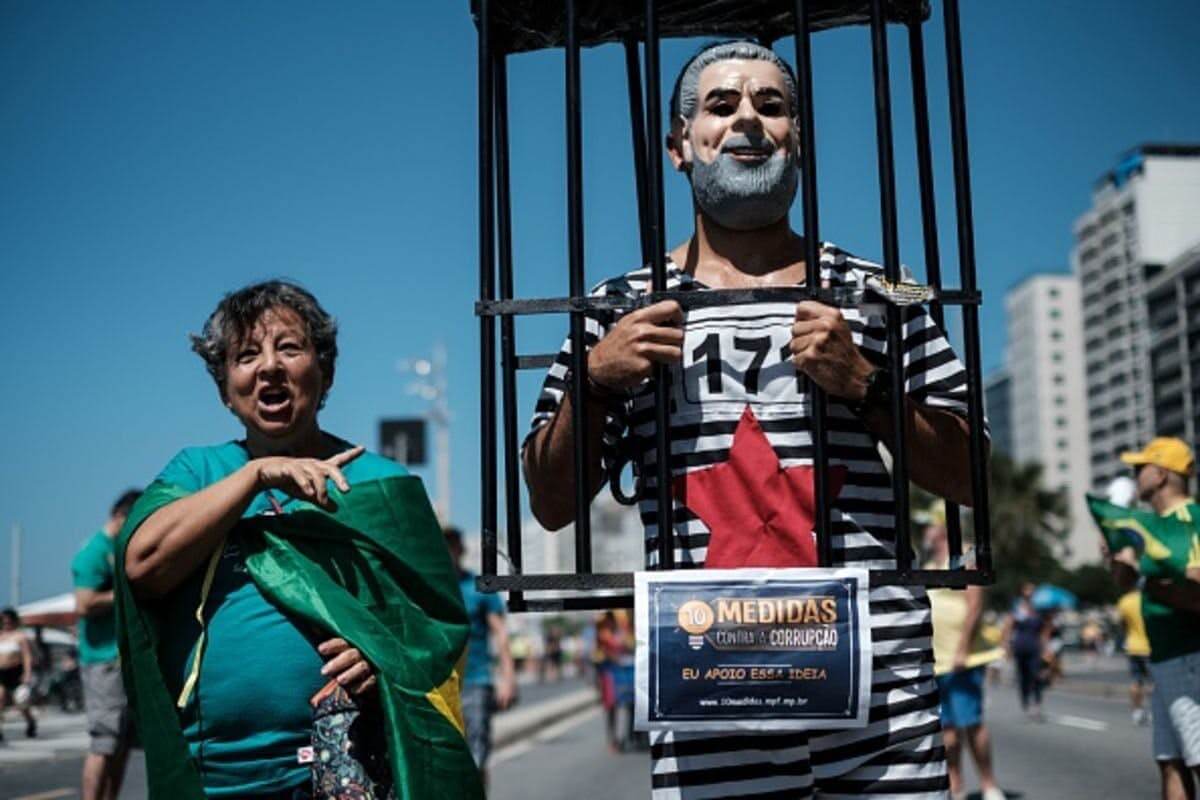Curbing corruption requires better protection for those willing to call it out.
By Mac Margolis
In Latin America, crooked business goes by many names. Coima, propina, the bite and — my favorite — "milk for the kids" are just a few. However you call corruption, people in 13 countries in the Americas agreed that it is one of the region's biggest scourges, according to pollster Latinobarometro. The algae bloom of scandal trailing dodgy Brazilian contractor Odebrecht SA's continental dealings has only cemented that conviction.
Saying "basta" to dirty deals is one thing; fingering culprits is quite another. The systemic nature of fraud and graft in Latin America discourages nonconformists, and the complicity of sitting government officials and ranking executives makes whistle-blowers more vulnerable targets. It's bad enough when those who speak up aren't taken seriously. Ask Mario Vargas Llosa, the Peruvian Nobel literary laureate: In 2001, he fell out with his son Alvaro, who'd voiced "unjust and exaggerated" warnings about overly cozy relations between Odebrecht and then presidential hopeful Alejandro Toledo. The chill lasted years — until Toledo fled Peru earlier this year ahead of charges he'd taken $11 million in illegal campaign cash from an Odebrecht bag man. "I now ask [my son's] forgiveness for the row and laud his suspicions and sense of justice," Vargas Llosa wrote recently in El Pais.
Some individuals have been willing to speak out or at least to demure when illicit deeds or temptations loom. That fearlessness is a heartening sign in societies where scruples sometimes seem a luxury and elected office, a private franchise. Unless Latin Americans can not only encourage but protect their refuseniks, however, these gains will ephemeral.
The stakes are considerable, as the latest scam involving dicey practices at Brazil's slaughterhouses has shown. The toxic pact between some outlaw meat-packers and allegedly crooked health inspectors might never have come to light, let alone bloom into an international scandal, if not for an upright bureaucrat, who tipped off the federal police after higher-ups in the agriculture ministry ignored his back-channel warnings.
Last year, Mexican highway police drew praise, and not a few gasps, when they pulled over fugitive drug lord Joaquin "El Chapo" Guzman and arrested him rather than look the other way and pocket the difference.
Then there was the case of the El Salvador national football team: Last September, it declined and denounced a proposal to fix a match in a World Cup qualifier. The team's public "no" stood in sharp contrast to the collective "sí" another Salvadoran squad gave to game-fixing in 2013, thereby landing 14 players a lifetime ban from the beautiful game.
The penalty for taking such stands looms large, however. Consider the fate of Jose Maria Bakovic, a former World Bank analyst and Bolivian bureaucrat who tried to clean up the government's graft-riddled roads services department but ran into a wall of vested interests. He became a target of investigation himself, after populist strongman Evo Morales was elected president in 2006. Ill and ageing, Bakovic spent his last years trying to clear his name in 72 lawsuits in courtrooms across Bolivia, finally collapsing after being ordered to a hearing — against doctor's orders — in the thin air of La Paz, the 3,600-meter-high capital. The coroner reported that he died of heart failure; former President Jorge Quiroga called the cause "judicial bullying."
In a region where witness protection is frail and the independent judiciary a work in progress when it isn't a fiction, that anyone speaks up at all is a wonder. This failing is not just ethical, but institutional. "In countries that have the rule of law, those who say no to corruption have a chance," said Venezuelan-born human rights advocate Thor Halvorssen, of the New York-based Human Rights Foundation. "In the southern cone, whistle-blowers get shamed and persecuted."
Some countries have made whistle-blowing easier. Brazil’s three-year-old Carwash investigation has taken down scores of bent executives and public officials thanks in great part to the 2014 Clean Company law, a U.S.-inspired bill that encouraged reporting crimes and enabled investigators to lighten penalties for criminals who recant and expose others. Argentina recently extended protections and benefits to citizens who flag corruption. Having recently passed an anti-bribery law, Colombia is now weighing a Whistle-Blower's Protection Bill. After years of national scandals and resistance in congress, Mexico is set to enact a new law on Administrative Accountability this summer.
Latin America's increasing engagement with the global economy has helped, as companies that do business abroad must comply with tighter international anti-bribery compacts, such as the U.S. Foreign Corrupt Practices Act and the United Kingdom's Bribery Act. As a result, U.S. regulators are receiving reports on corruption from a growing number of countries across Latin America, while tip-offs from Brazil doubled from 2014 to 2015.
And yet there is much more to do. A 2016 survey by Miller & Chevalier, a Washington law firm, found that since 77 percent of respondents in 19 Latin American countries had little faith in anti-corruption measures, most thought reporting illicit activity a "futile exercise." That could explain why another Brazilian refusenik, Flavio Turquino, quietly quit his job in the agriculture ministry when he learned of a bribery scheme linked to disgraced federal lawmaker Eduardo Cunha, who was deposed and jailed for taking bribes and influence peddling last year in the Carwash case.
True, Turquino didn't call out Cunha for the crime, but at least he did say no.
Read the article on Bloomberg here: https://www.bloomberg.com/view/articles/2017-03-28/latin-america-needs-more-whistle-blowers

